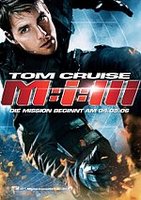X-MEN 3: THE LAST STAND
 Director: Brett Ratner (Red Dragon, Rush Hours 1-3)
Director: Brett Ratner (Red Dragon, Rush Hours 1-3)Starring: Hugh Jackman, Patrick Stewart, Ian McKellen, Kelsey Grammer, Famke Janssen, more
With only a paltry $150 million budget, a battalion of stars and/or quality actors, a director with an action movie pedigree, and some mind-numbingly pedestrian writing, X-Men 3 has managed to scale the precipitous cliffs of Mr. Cheese and now sits atop looking down at all of the better movies in the landscape. Yes, this film was cheesy. Stinky, room-temperature cheese even. A slightly warm gorgonzola perhaps.
Not since Independence Day and its America versus the Universe battle royale has there been a film of such cheeseball Momentous Climactic All-emcompassingness. Strangely this appears to have been mostly achieved by back-lighting of Famke Janssen while she demolished things, but the copious special effects and dialog that included phrases like “Mark my words”, “Make no mistake”, and “Let’s suit up” certainly helped . Frankly the script was almost George Lucas bad. People (X-men mutants or not) simply don’t say “Make no mistake”. Well, at least people other than President Bush don’t.
Make no mistake about it, X-men 3 is probably the most comic book of comic book movies that have ever been filmed.
I should note, however, that this film did try to touch on important subjects. The plot in this installment focuses on a “cure” for the X-men gene that has been discovered. A war rages with some mutants (the X-men) trying to calm all of the parties down, while the US government and the more violent mutants (as always led by Ian McKellens Magneto character) duke it out. Certainly this seems to touch on difficult subjects like potential "cures" for homosexuality and also the struggles of minorities in our own culture (there's no doubt a relationship between Martin Luther King, Malcolm X and the X-men). All of these were very, very light touches, however. And really, bringing up these complicated social issues and then seemingly solving them with fiery special effects doesn’t make much sense. Or doesn’t it? Maybe we can solve prejudice by exploding cars and tearing down bridges. Yeah. Bang.
Despite all of this, I’ve always had a vague enjoyment in the X-men movies (just like Independence Day for that matter). Of the three this will be my least favorite. It was the least well constructed of the lot, and of course the cheesiest. I am happy to say that after this terrifically climactic plot there don't appear to be enough main characters left from which to assemble an X-Men 4. Many key mutants were either killed off, or rendered less than super-heroic. I have heard rumors of a Wolverine (Hugh Jackman) spinoff, however. Although narrowing down the subject matter may actually help out this franchise. Certainly this film had too many characters trying to cover too many subjects in too short a time.
Standouts: Some good actors having fun with really bad dialog.
Blowouts: Mark my words, and make no mistake about it, let’s suit up and listen to some bad dialog.
Grade: C



